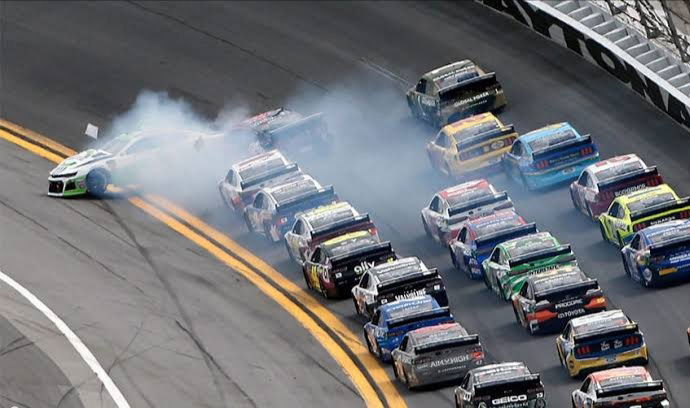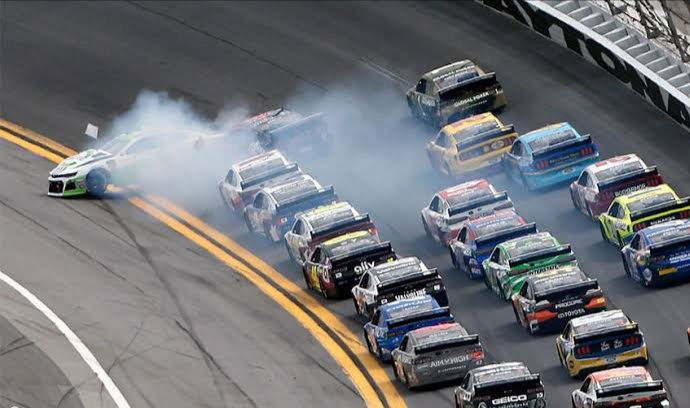
Imago
Via NASCAR

Imago
Via NASCAR

Imago
Via NASCAR

Imago
Via NASCAR
NASCAR executives have sparked a wave of speculation with the recent unveiling of the 2026 Cup Series schedule, blending fresh twists with nods to the sport’s roots. Fans are buzzing over the return of Chicagoland Speedway, absent since 2019, now slotted for July 5 after years of sitting idle amid calls for its revival. North Wilkesboro Speedway also gets a spotlight, earning its first points-paying Cup race on July 19 since 1996, rewarding those who’ve championed its gritty history.
Watch What’s Trending Now!
Ben Kennedy, NASCAR’s Executive Vice President, said that the schedule is “a good blend… of innovation and tradition, of being able to celebrate our history and our roots.” But with whispers of bigger shifts ahead, could this setup signal tougher choices for beloved venues?
The real firestorm ignited when journalist Jeff Gluck shared Ben Kennedy’s comments on a potential Canada race, quoting the NASCAR exec: “We’d love to be both north of the border and south of the border in the future. (Canada) is something we’re taking a look at as we think about 2027 and beyond.” Kennedy added that it’s “something high in our consideration set for ’27,” hinting at a deliberate strategy to expand beyond U.S. soil. This comes after NASCAR’s 2025 Mexico City debut, which drew massive crowds and showcased Daniel Suarez‘s emotional victory but was sidelined in 2026 over scheduling conflicts with the FIFA World Cup.
Ben Kennedy got asked about a Canada race: “We’d love to be both north of the border and south of the border in the future. (Canada) is something we’re taking a look at as we think about 2027 and beyond.” Adds it’s “something high in our consideration set for ’27.”
— Jeff Gluck (@jeff_gluck) August 20, 2025
The international push aims to tap into untapped markets, growing the fanbase as NASCAR seeks global relevance. Kennedy noted the Mexico partnership was “an incredible feat” that brought new fans to the sport. Yet, this ambition threatens traditional tracks by squeezing the 36-race calendar; for instance, adding foreign dates could echo how Mexico’s entry displaced U.S. slots, potentially endangering venues like Dover, which lost its points race to the All-Star event in 2026, or Kentucky Speedway, dormant since 2020 despite its intermediate-track appeal.
NASCAR’s reasoning ties into long-term growth, with Kennedy explaining the need to “explore” opportunities like Canada, where the series last raced nationally in 2012 at Montreal’s Circuit Gilles Villeneuve. This follows patterns seen in 2026 additions, such as San Diego’s Naval Base Coronado street course on June 21, which replaces Chicago’s street event and underscores a shift toward novel formats.
But critics argue it risks alienating core fans tied to heartland ovals; tracks like Auto Club were axed for redevelopment, and now international bids could further dilute spots for places like Portland, which was dropped from the Xfinity schedule. Kennedy reinforced the balance, saying, “We’d love to be in the Pacific Northwest at some point… or Colorado,” but the Canada focus highlights how global aspirations might force out established U.S. fixtures, fueling tensions over preserving NASCAR’s domestic heritage.
As these plans unfold, fan voices are amplifying the divide, with one Reddit user quipping, “Anytime I hear Canada and NASCAR, Montreal 2007 comes to mind. God!, what a cluster that finish was!” That chaotic race, marred by rain and controversy, still lingers in memories, setting the stage for heated reactions to any northern revival. Here’s what the other fans had to say.
Fans sound off on the international shift
One fan declared, “2027 race in Canada, North Carolina confirmed,” capturing optimism tied to Kennedy’s hints while nodding to North Carolina’s secured spots like Charlotte’s dual dates. This echoes NASCAR’s 2026 emphasis on regional strongholds, where tracks like North Wilkesboro regain prominence, but it overlooks how international additions could strain the calendar. Historically, North Carolina has been NASCAR’s backbone, hosting over 100 Cup events at Charlotte alone since 1960, yet global pushes have already shifted focus, as seen with Mexico’s 2025 pulling one slot away from a US venue in Richmond.
Another reacted sarcastically: “Absolutely not, those poor fans in the Carolinas are gonna starve if you do that.” This jabs at the fear of diluting Southern roots, where tracks like Darlington hold two dates in 2026, but international growth could threaten them. NASCAR owns many Carolina venues, easing conflicts, yet adding Canada might force cuts elsewhere. The Carolinas boast deep ties, with fans attending events like the Coca-Cola 600 since 1960, creating economic booms.
“Canada Motor Speedway was tried but failed miserably after a pissing contest. It was in development hell for years.” This recalls the 2006 proposal for a Fort Erie oval, derailed by zoning battles and developer disputes, never breaking ground despite promises of 80,000 seats. The fiasco highlights risks in Canadian ventures, contrasting with successful U.S. revivals like Chicagoland‘s 2026 return, underscoring why NASCAR treads carefully on foreign soil.
One fan said, “I’m down, but that would make absurdly no sense financially.” Skepticism stems from high costs of international logistics, like the Mexico City event’s transport challenges, which Kennedy praised but noted required “incredible” planning. Canada’s sparse NASCAR history, with the last Xfinity Cup-level interest in 2012, raises doubts on ROI, especially versus U.S. tracks like Watkins Glen, which shifted to May 2026 for better weather and attendance.
Finally, a user pointed out, “The NASCAR season is nine months long, and almost half their weekends are at tracks directly owned by NASCAR. A schedule conflict for two months is not relevant.” This defends feasibility, noting NASCAR‘s ownership of 13 tracks hosting 18 weekends in 2026, allowing flexibility for additions like Canada without major disruptions.


